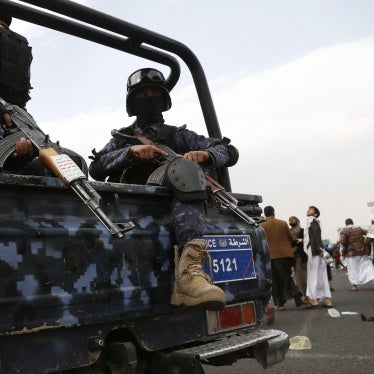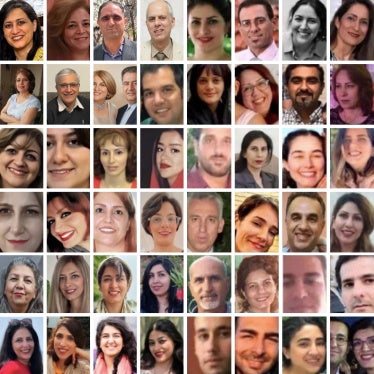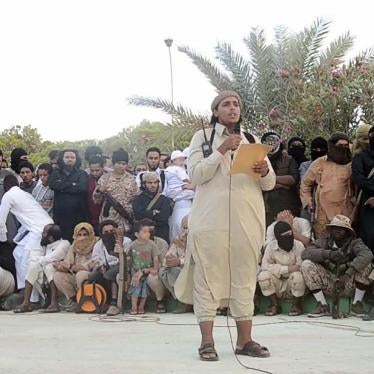(New York) – Armed opposition groups appeared to have deliberately destroyed religious sites in mixed areas of Northern Syria, in November and December 2012, Human Rights Watch said following investigations in Latakia and Idlib governorates. An armed opposition group destroyed a Shia place of worship in Idlib governorate, and two Christian churches in Latakia governorate were looted. In all three cases evidence examined by Human Rights Watch suggests, and witnesses stated, that the attacks took place after the area fell to opposition control and government forces had left the area.
While some opposition leaders have pledged to protect all Syrians, in practice the opposition has failed to properly address the unjustified attacks against minority places of worship, Human Rights Watch said. The opposition also has failed to rein in gunmen engaging in looting and other criminal activities, like kidnappings. Human Rights Watch urged armed opposition groups to protect all religious sites in areas under their control and to discipline members who loot or kidnap.
Human Rights Watch has previously documented the destruction and vandalization of a mosque in Taftanaz, Idlib by Syrian government forces.
“The destruction of religious sites is furthering sectarian fears and compounding the tragedies of the country, with tens of thousands killed,” said Sarah Leah Whitson, Middle East director at Human Rights Watch. “Syria will lose its rich cultural and religious diversity if armed groups do not respect places of worship. Leaders on both sides should send a message that those who attack these sites will be held accountable.”
Under international humanitarian law, parties in an armed conflict have a responsibility not to intentionally attack religious buildings that are not being used for military purposes. They are prohibited from seizing, destroying, or doing willful damageto religious buildings or institutions and from theft, pillage, or vandalism directed against important cultural property. Deliberate attacks on religious sites that are not military objectives are war crimes.
Human Rights Watch researchers conducted a four day investigation in the Latakia and Idlib countryside in opposition-controlled areas into abuses by both government and opposition fighters in Sunni, Alawite, Christian, and mixed sect villages. In three villages – Zarzour, Ghasaniyeh, and Jdeideh – Human Rights Watch found evidence of attacks against religious minority sites after the areas fell under the control of armed opposition groups and government forces had left the area.
Residents also told Human Rights Watch that armed opposition gunmen looted some homes after taking control of the town and kidnapped two local villagers in Ghasaniyeh and Jdeideh. Human Rights Watch was unable to determine whether the looting and kidnapping were religious attacks. Media reports also indicate that looting and kidnapping of Sunni residents has taken place in opposition controlled areas.
In all three villages, religious minorities had either all fled or left their homes in large numbers. Residents in Zarzour, a predominantly Sunni village with a small Shia population, told Human Rights Watch that their Shia neighbors had fled because they feared retaliation by opposition forces because, in their opinion, the local Shias had been supportive of government forces.
These residents said this perceived support was reflected in alleged preferential treatment that government forces gave to Shia residents when the government forces were in the village. In Ghasaniyeh and Jdeideh, two Christian villages in Latakia, residents told Human Rights Watch that many of their neighbors fled because of dire humanitarian conditions, fear of armed opposition fighters in their area, and fear of air and artillery strikes by government forces.
All parties to the conflict should promote conditions that would allow civilian populations to remain in their homes, Human Rights Watch said. The Syrian government should stop deliberate and indiscriminate air and artillery strikes against civilians, and opposition leadership should protect all civilians in their areas, including members of religious minorities, from any retaliatory attack or criminal activity. All parties should facilitate the delivery of humanitarian assistance to areas under their authority.
Attack on Zarzour Husseiniya
Human Rights Watch researchers observed what appeared to be deliberate damage to the local husseiniya, a Shia place of worship, caused by opposition fighters after they had taken control of Zarzour village on December 11. Local opposition fighters who spoke to Human Rights Watch said that Syrian government forces caused the damage in the husseiniya before they left the town, but two local residents said that the armed opposition started the fire in the mosque when they took control of the city. Other evidence observed by Human Rights Watch researchers indicated that the damage was deliberate. The husseiniya windows were broken, prayer stones littered the floor, two of the interior walls were blackened from flames, and a religious poster had been torn off of the wall, with remnants of the poster left behind. Human Rights Watch researchers also saw remnants of burned posters and papers, and what appeared to be the remnants of a burned prayer rug in the building. Burned items were lying together on the floor, appearing to indicate they were piled on top of one another and deliberately set on fire.
A video published on YouTube on December 12 taken in front of the husseiniyashowed opposition fighters celebrating their victory in the town as a fire burns in the mosque in the background. The video supports the claim that the damage was intentionally inflicted after the government forces had left the area, Human Rights Watch said. In the video, one man who appears to be an opposition fighter announces the “destruction of the dens of the Shias and the Rafida,” a derogatory term used to refer to Shias. He identifies himself as a member of the Amr bin Ma’ad Yakrib al-Zubaydi Brigade. The video also shows graffiti on the wall in front of the mosque, which exclaims, “No, and a thousand nos, to sectarian strife.” By the time Human Rights Watch researchers were in Zarzour one week later, this graffiti had been written over.
One resident told Human Rights Watch that while the Syrian army was in the village, they used the husseiniyaas barracks. According to him however, the army withdrew from the building after Shias in the village complained and before the opposition attacked. Two residents said that an army sniper remained on top of the building after that, but withdrew before the opposition forces attacked the building. Human Rights Watch observed several sandbags on top of the mosque, appearing to corroborate the claim that a sniper was positioned there.
Human Rights Watch condemns the Syrian government’s use of the husseiniya for military purposes before the opposition took control of the village. The use by any party to a conflict of property of great importance to the cultural heritage of any people for purposes that are likely to expose it to destruction or damage is prohibited, unless imperatively required by military necessity. However, such behavior does not absolve the opposition of the obligation not to inflict intentional damage to the husseiniya once it was no longer a military object.
Looting of Churches in Ghasaniyeh and Jdeideh
Local residents told Human Rights Watch that armed gunmen operating “in the name of the opposition” also broke into and stole from Christian churches in the villages of Ghasaniyeh and Jdeideh, in Latakia governorate, after the villages fell under opposition control.
A Jdeideh resident told Human Rights Watch that after the armed opposition took control of the village on December 11 and government forces had fled, gunmen broke into and stole from the village church and fired numerous shots inside, causing structural damage. Human Rights Watch visited the church on December 18 and observed that the doors bore signs of forced entry, and the windows were shattered. The church doors had been welded shut since the attack to protect against further attack.
The resident said that opposition forces also used the priests’ quarters next to the church to shoot at a neighboring village where government forces were present. In the process, the windows of the priests’ quarters were broken. He also told Human Rights Watch that people acting “in the name of the opposition” had stolen medicine from a clinic belonging to the church, looted homes, and kidnapped civilians. In one kidnapping during the summer of 2012, before opposition fighters controlled the village, he said that a family paid three million Syrian pounds (approximately US$42,250) to free their relative.
A Ghasaniyeh resident told Human Rights Watch that after armed gunmen operating “in the name of the opposition” came into the village in late November they broke into the local church and stole the gas and diesel fuel there. On December 15, Human Rights Watch visited the church, and observed that the church doors had been forced open. A cross had been left on the floor of the church, but the church otherwise appeared undamaged.
The resident also told Human Rights Watch that opposition fighters had looted homes and kidnapped one resident, who remained missing. Two men from a local opposition group took the kidnapped man, a civilian whom he knew personally, from his home after opposition forces had taken control of the village. Despite his family’s efforts to secure his release by communicating with the kidnappers and the opposition fighters’ leader, they had not freed him as of December 15.
But the resident who spoke to Human Rights Watch said that people in the town had good relationships with many opposition fighters. Armed opposition fighters with whom Human Rights Watch spoke in the village maintained that they were not responsible for the attack on the church.
While the motivation for the church break-ins may have been theft rather than a religious attack, opposition fighters have a responsibility to protect religious sites in areas under their control from willful damage and theft, Human Rights Watch said.
“The opposition in Syria should back up its claims that it will uphold minority rights by protecting places of worship, and more generally ensuring that gunmen acting in its name respect civilians and civilian properties,” Whitson said.








